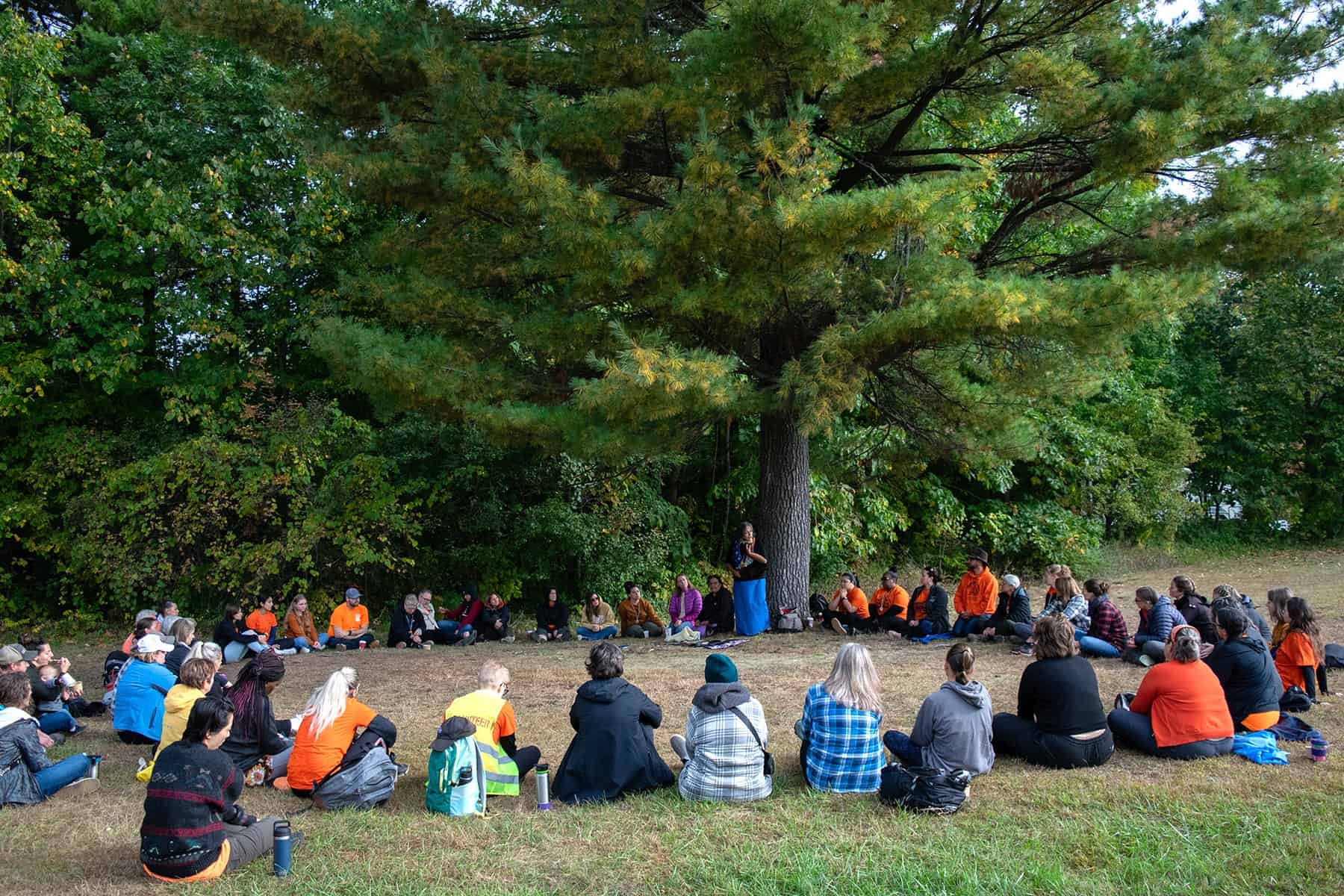
A global PhD network for research and collaboration: Frontline research – Part II
Thank you to current and former PhD Students Lisa Frances, Antoine Deschamps, Emilie Skoglys, Yannick Lacoste, Marie-Claude Beaudry, Theres Mühlberg, Elena Diana, Tommaso Reato, Dorte Eggersen, Salvatore Laneri, Katrine Bergkvist Borg, and researchers Mads Bølling, PhD (Center for Clinical Research and Prevention) and Karen Seierøe Barfod, PhD (VIA University College) for providing this post on behalf of the international network of PhD Students in School-based Outdoor Learning and Teaching.
Part II – This blog post, part 2 of a series of 3 on an international PhD network in school-based outdoor education, highlights four emerging research areas explored by PhD students as part of this network: 1) outdoor practices in schools, 2) teaching methods, 3) place-based literacy, and 4) science education outdoors.
The first blog post can be found here.
PhD projects in the network within the four emerging areas explore how outdoor learning benefits students and teachers; the training needed for effective implementation; how place-based approaches support literacy and sustainability; and the value of outdoor science education across all educational levels. The overarching aim is to enhance engagement, wellbeing, and learning through real-world, nature-based experiences.
School-based outdoor practices
Lisa Frances (University of New England, Australia), Antoine Deschamps (Université de Sherbrooke, Canada), and Emilie Skoglys (University of Agder, Norway)
School-based outdoor practices occur both within and beyond school grounds and can vary substantially across geographic and cultural borders. The benefits of school-based outdoor education are well established, including affective, cognitive, interpersonal, social, physical and behavioural benefits for students (Bølling et al., 2023; Kuo et al., 2019; Rickinson et al., 2004). Recent studies have identified additional advantages for teachers, such as increased job satisfaction, reduced stress, and improved teacher-pupil relationships (Deschamps et al., 2022; Mygind et al., 2019).
The systemic and pedagogical conditions necessary for successful implementation remain underexplored. Insights from educators adapting outdoor learning to promote inclusion and mental health can offer valuable guidance.
Despite these compelling arguments, research across several countries highlights a decline in outdoor learning and play opportunities as children transition from early childhood education settings (e.g. preschool), into formal school settings and higher grades (Patchen et al., 2022; Lauterbach et al., 2024; Waite, 2010). Particularly concerning is the inequitable access to outdoor learning opportunities between preschool and school settings. Despite similar ages and developmental needs, children in the first year of school often have reduced outdoor learning and play opportunities compared to their preschool counterparts (Frances et al., 2024).
As a global network of PhD students committed to advancing school-based outdoor learning and play practices through our research, we are leading several projects. For example, in Australia we are engaging in action-based research exploring outdoor learning practices in the first year of school, with the aim of increasing and enhancing implementation. Additionally, we will be conducting a scoping review of factors that support school-based outdoor education in secondary schools and a case study of a Canadian secondary school implementing regular outdoor teaching. Furthermore, ongoing qualitative research in Norway is exploring educators’ experiences with implementing a school-based outdoor education model, alongside its impacts on pupils’ and parents’ experiences of quality of life.
Teachers and teaching
Yannick Lacoste (Université du Québec à Montréal, Canada), Marie-Claude Beaudry (Université de Sherbrooke, Canada), Theres Mühlberg (Technical University of Munich, Germany), and Elena Diana (University of Pisa and University of Florence, Italy)
The literature on school-based outdoor education and education outside the classroom (EOtC) (Barfod & Bentsen, 2018) highlights its benefits for teaching and learning (Ayotte-Beaudet et al., 2023; Becker et al., 2017), health and well-being (Becker et al., 2017; Kuo et al., 2019), and environmental awareness and eco-citizenship (Becker et al., 2017; Dale et al., 2020). Despite well-documented benefits, school-based outdoor education faces persistent challenges (e.g., teachers’ lack of confidence, doubt over academic rigor, fears overclass management and having sufficient resources) that continue to hinder its implementation by teachers (Edwards-Jones et al., 2018).
To address implementation challenges related to teachers’ practice, the scientific community highlights the need for high-quality teacher training and ongoing professional development (Mann et al., 2022).
To support the effective implementation of school-based outdoor education, our PhD projects aim to identify what kind of training and pedagogical support teachers need in different educational contexts. Our work concerns a scoping review of reviews on training in school-based outdoor education and a research and development study to create quality pre-service teacher training. In addition, a reflective thematic analysis of the practices of EOtC by Italian and Danish primary school teachers—part of the Udeskole network in Denmark, “UdeskoleNet”, and the “Scuole all’Aperto” network in Italy—conducted using qualitative data collection methods, will highlight shared themes between countries regarding these challenges. Additionally, to get better insight into teaching that occurs during EOtC classes, observations of EOtC and classroom teaching was conducted in German elementary schools. To expand the international scope of this work, upcoming research will include studies with K–6 teachers in Canada, particularly in science education, to better understand how outdoor learning is broached across disciplines.
Place-based reading and writing
Tommaso Reato (University of Padua, Italy), Dorte Eggersen (VIA University College & Aarhus University, Denmark), and Salvatore Laneri (University of Palermo, Italy)
Language education is a central component of the curriculum at every grade level. A challenge of EOtC approaches in school contexts is to deal with first language subjects. Exploring the relevance and pedagogical values of linguistic and literary teaching practices that intertwine with embodied learning in, from, and about places is the purpose of research interested in place-based reading (Eggersen, 2024; Laneri, 2024) and place-based writing (Reato, 2024). These are complementary and aligned practices and research approaches, although developed in different socio-cultural contexts: Denmark and in Italy, respectively.
There are several theoretical frameworks that inspire these language practices and research approaches, such as the outdoor and place-based pedagogies (Bentsen et al. 2009; Gruenewald, 2003), the phenomenology of places (Casey, 1993, Greve, 2008), ecological and emancipatory pedagogies (Biesta, 2021), an embodied understanding of literacy practices (Ingold, 2020), as well as topographic literary theories (Moeslund, 2010).
Qualitative analysis of students’ experiences also suggests many common elements, from which the most evident is about the bidirectional text-place attention (e.g., attention towards text (reading and imagining) and attention towards place (the environment – e.g. buildings, brickwalls, the sea or whatever decribed in-text). Working with either placebased reading or placebased writing can widen students’ attention to include both the text and the place. This can promote learning processes based on exploring and discovery and also support the development of linguistic skills.
In a broader sense, finding creative ways to support student educational experiences that promote a connection to place may be a more inclusive approach to learning while also fostering pro-environmental behaviour. How all these concepts intertwine with each other may inform future studies and school practices.
Science education outdoors
Katrine Bergkvist Borch (University of Southern Denmark, Denmark)
Science is everywhere, especially outdoors, and outdoor teaching is crucial for learning science, across educational levels from early childhood education to tertiary education. Science education takes place in three different types of learning environments: Classroom, laboratories, and field settings. Field settings as learning environments are especially under-studied (Borch & Svabo, 2025).
Outdoor science education in primary education and early childhood education can support cross-curricular learning connected to place (Fägerstam, 2012). Furthermore, varied outdoor experiences can potentially connect children cognitively and emotionally with the natural world (Carrier & Stevenson, 2017). In secondary school, outdoor science education can contribute to a joyful learning environment, and it has both cognitive, social and emotional outcomes (Fägerstam, 2012). In higher education, science fieldwork can promote not just knowledge and skills but also more general generic and transferable competencies (e.g. teamwork, oral and written presentations; Harper et al., 2016).
This ongoing PhD research project concerns science fieldwork in nature-based learning environments. Preliminary findings show that immersive, sensory experiences promote curiosity, exploration and nature connectedness, especially if supported by pedagogical practices that allows for weather and place (Ingold, 2010) as well as non-human agents (as for example other species and field equipment) (Barad, 2003), to inform the experience.
Following blog posts III: The frontier of outdoor learning and teaching research
This blog post has introduced four research themes currently being explored within the PhD network, each offering new insights into how school-based outdoor education is understood, implemented, and experienced across diverse educational contexts. From inclusive practice and teacher development to language and science education outdoors, these projects reflect a shared commitment to rethinking schooling beyond classroom walls. The network’s strength lies in its ability to gather such varied approaches and perspectives, offering fertile ground for both critical dialogue and collaborative development.
To learn more about how you can get involved with the PhD Student School-based Outdoor Learning and Teaching Network, contact Mads Bølling at: mads.boelling@regionh.dk and/or Karen Barfod at: ksba@via.dk.
This blog post is the second in a series of three consecutive posts. In the third and final blog post, we continue the exploration of emerging fields by turning to three additional research perspectives that address how school-based outdoor education can foster children’s connection to land, place, and nature. The series concludes with reflections on the potential of international PhD networks to shape future collaboration and innovation in school-based outdoor education research.
References
Ayotte-Beaudet, J.-P., Chastenay, P., Beaudry, M.-C., L’Heureux, K., Giamellaro, M., Smith, J., & Desjarlais, E. (2023). Exploring the impacts of contextualised outdoor science education on learning: The case of primary school students learning about ecosystem relationships. Journal of Biological Education, 57(2), 277–294.
Barad, K. (2003). Posthumanist performativity: Toward an understanding of how matter comes to matter. Signs: Journal of Women in Culture and Society, 28(3), 801–831.
Becker, C., Lauterbach, G., Spengler, S., Dettweiler, U., & Mess, F. (2017). Effects of regular classes in outdoor education settings: A systematic review on students’ learning, social and health dimensions. International Journal of Environmental Research and Public Health, 14(5), 485.
Biesta, G. (2021). World-centred education: A view for the present. Routledge.
Borch, K. B., & Svabo, C. (2025). Science learning environments in higher education: Researching classroom, laboratory, and field settings. Education Sciences, 15(2), 213.
Bølling, M., Mygind, L., Elsborg, P., Melby, P., Barfod, K., Brønd, J., Klinker, C., Nielsen, G., & Bentsen, P. (2023). Efficacy and mechanisms of an education outside the classroom intervention on pupils’ health and education: The MOVEOUT study protocol. BMC Public Health, 23(1), 1825.
Carrier, S. J., & Stevenson, K. (2017). Children experiencing the outdoors: A natural setting for science learning in the United States. In E. Kimonen & R. Nevalainen (Eds.), Reforming teaching and teacher education: Bright prospects for active schools (pp. xx–xx). Sense Publishers.
Casey, E. S. (1993). Getting back into place: Toward a renewed understanding of the place-world. Indiana University Press.
Dale, R. G., Powell, R. B., Stern, M. J., & Garst, B. A. (2020). Influence of the natural setting on environmental education outcomes. Environmental Education Research, 26(5), 613–631.
Deschamps, A., Scrutton, R., & Ayotte-Beaudet, J.-P. (2022). School-based outdoor education and teacher subjective well-being: An exploratory study. Frontiers in Education, 7.
Edwards-Jones, A., Waite, S., & Passy, R. (2018). Falling into LINE: School strategies for overcoming challenges associated with learning in natural environments (LINE). Education 3–13, 46(1), 49–63.
Eggersen, D. (2024). Place-based reading: Literature didactics outside the classroom. L1-Educational Studies in Language and Literature, 24(1), 1–19.
Fägerstam, E. (2012). Space and place: Perspectives on outdoor teaching and learning (PhD dissertation). Linköping University Electronic Press.
Frances, L., Quinn, F., Elliott, S., & Bird, J. (2024). Outdoor learning across the early years in Australia: Inconsistencies, challenges, and recommendations. The Australian Educational Researcher.
Greve, A. (2008). Stedets tider. I E.-M. Syversen & G. Vestad (Red.), Stedet i litteraturen. Oplandske Bokforlag.
Gruenewald, D. A. (2003). The best of both worlds: A critical pedagogy of place. Educational Researcher, 32(4), 3–12.
Harper, L., Downie, J., Muir, M., & White, S. (2016). What can expeditions do for students … and for science? An investigation into the impact of University of Glasgow Exploration Society expeditions. Journal of Biological Education, 1–14.
Ingold, T. (2020). Correspondences. John Wiley & Sons.
Kuo, M., Barnes, M., & Jordan, C. (2019). Do experiences with nature promote learning? Converging evidence of a cause-and-effect relationship. Frontiers in Psychology, 10.
Laneri, S. (2024). Come dentro la poesia: Educazione letteraria all’aperto e metacognizione. Per Leggere, 24(47), 161–188.
Lauterbach, G., Bølling, M., & Dettweiler, U. (2024). Education outside the classroom in Norway: The prevalence, provision, and nature of Uteskole. International Journal of Education Research, 125.
Mann, J., Gray, T., Truong, S., Brymer, E., Passy, R., Ho, S., & Sahlberg, P. (2022). Getting out of the classroom and into nature: A systematic review of nature-specific outdoor learning on school children’s learning and development. Frontiers in Public Health, 10, 877058.
Moslund, S. (2010). The presence of place in literature – with a few examples from Virginia Woolf. Aktuel forskning ved llkm.
Mygind, E., Kjeldsted, E., Hartmeyer, R., Mygind, L., & Bølling, M. (2019). Immersive nature-experiences as a health promotion intervention: A systematic review and meta-analysis. Frontiers in Psychology, 10, 943.
Patchen, A., Rakow, D., Wells, N., Hillson, S., & Meredith, G. (2022). Barriers to children’s outdoor time: Teachers’ and principals’ experiences in elementary schools. Environmental Education Research, 1–21.
Paulsen, M., Illeris, H., & Reato, T. (2025). Wilding pedagogy with nature writings, propositions and minor experiences: Twisting with more-than-humans towards life-friendly education. Australian Journal of Environmental Education, 41(2), 338–354. https://doi.org/10.1017/aee.2025.15
Reato, T., & Fedeli, M. (2025). Building eco-narrative communities in school: A qualitative research starting from a place-based writing practice. Formazione & Insegnamento, 23(1), 52–60. https://doi.org/10.7346/-fei-XXIII-01-25_08
Rickinson, M., Dillon, J., Teamey, K., Morris, M., Choi, M. Y., Sanders, D., & Benefield, P. (2004). Review of research on outdoor learning. National Foundation for Educational Research (NFER).
Waite, S. (2010). Losing our way? The downward path for outdoor learning for children aged 2–11 years. Journal of Adventure Education and Outdoor Learning, 10(2), 111–126.

